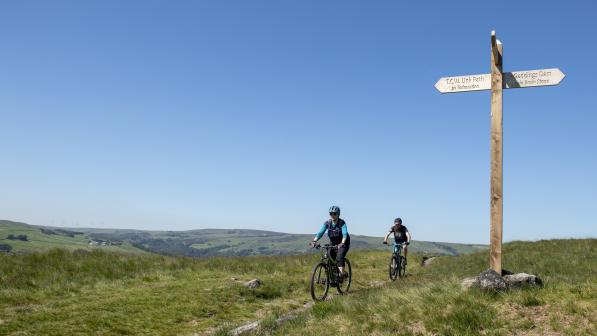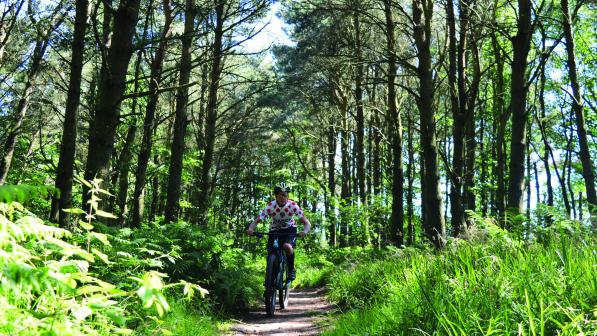Bike test: Trail hardtail mountain bikes

Trail hardtails are a very British kind of mountain bike. It’s no coincidence that the Big Trail 500, from Taiwanese brand Merida, is described as “a UK-inspired singletrack-crushing hardtail” and that the designed-in-the-UK Voodoo Loco is billed as “a true British, steel, hardcore hardtail”.
Frame and fork
Progressive geometry has progressed a long way now. The Merida Big Trail 500 and Voodoo Loco have unsagged head angles of 64º and 63.5º respectively. With low-offset forks, the trail figures are huge, providing imperturbable steering.
Wide bars and short stems give you the leverage to wrestle the bikes around corners and to counteract the increased wheel flop, where the front wheel might otherwise ‘flop’ more into tight turns and oversteer, or veer off course on slow climbs.
Steep seat angles – Merida 76.5º, Voodoo 75º – tip you forward and weight the front wheel, helping to prevent snowploughing on downhill corners and accidental weaving uphill.
Those seat angles also mean a more upright riding position than you’d expect from the nominally long reach figures, which only show bottom bracket to head tube distances. Short chainstays, meanwhile, make it easier to keep the front wheel up over drop-offs and to take tighter lines through corners.

The net result is a forward-biased riding position that weights the fork (and your hands) but, with a long front centres distance, minimises the likelihood of diving over the handlebar. I’ve written ‘position’ rather than ‘positions’ as the two bikes are very similar, despite the Voodoo’s mixed (‘mullet’) wheel sizes.
The Voodoo is slightly shorter in the chainstays and slightly longer in the top tube, while the Merida is a little taller and steeper.
The Merida’s frame is aluminium, with a nice selection of fittings: two bottles (if you use side cages and small bidons) on the down tube, bolts for an under-top-tube bag, and mounts for a Merida Long Fender rear mudguard. It also has ISCG05 mounts for a chain guide.
The Voodoo has a chrome-moly steel frame finished in a lovely pearlescent racing green. There are gussets rather than flared tubing for reinforcement where the top and down tubes meet the head tube.
Mounts are limited to one bottle cage and some odd additions to the left-hand chainstay: mudguard and rack eyes on that side only, plus what looks like a kickstand mount.

Both bikes have 140mm forks that incorporate technology from higher-tier models, while being simpler and heavier. The RockShox Psylo of the Merida has 35mm stanchions, and in this Silver RC model they’re steel. It’s accordingly heavy – about 2.8kg.
The damper and air spring, RockShox says, “take cues from our premium series forks” (Lyrik, Pike). Adjustments are limited to: compression damping (firm or open); rebound damping (so it doesn’t pogo back over bumps); and air pressure, so you can set the fork sag for your weight.
Heavier, harder-riding folk can also add fork tokens if they’re bottoming out the suspension.
The Voodoo’s Marzocchi Bomber Z2 is more than half a kilo lighter than the Psylo as it uses aluminium stanchions. Its air spring is similar to those in Fox 34 forks and its seals have negligible stiction.
The adjustments are like the Psylo’s: air pressure, compression damping, rebound damping, and tokens if you want them. The Rail compression damper ramps up and down gradually rather than switching only between open and firm.

Components
Both bikes have inexpensive but effective dropper seatposts: 200mm for the Merida, 170mm for the Voodoo. Long-drop posts give you more freedom to move around the bike.
But when fully extended the Merida’s 200mm post put the saddle too high for me. I’d like to see trail bikes sold with a dropper post length to suit the frame size. Whyte does this (see ‘Other options’ below).
Although both bikes come with innertubes, their wheels and tyres are tubeless ready. The tyres are well chosen: both have a Maxxis Dissector on the rear and a Minion on the front, DHF for the Merida, DHR for the Voodoo.
Aggressive riders might want tyres with a stiffer or dual-ply casing, but I prefer the more pliable 120tpi EXO casing these have.
Tyre widths are fine for trail bikes: 2.4in or 2.5in. If you want to fit wider rubber, both have room for a 2.6in tyre in the frame and a 3in one in the fork, at least in drier weather. The rims are wide enough for 2.6in tyres.

All the wheels arrived true and stayed that way. However, the Voodoo’s 27.5in rear wheel was slightly out of dish, with the rim offset to the left. It didn’t upset the bike’s handling and isn’t hard to fix, but would be a bike shop job for some.
The Voodoo has a higher-tier drivetrain than the Merida: 1×12 Shimano Deore versus 1×10 Shimano CUES. While I’m happy enough with 10-speed, the Deore cassette is wider range and the Deore shifting was noticeably better on climbs.
Brakes are similar hydraulic units from Shimano, with both bikes getting a four-piston front brake. The Merida has a larger (203mm versus 180mm) front rotor, which makes sense for a trail bike. Yet single-finger braking was also fine on the Voodoo.
Both bikes’ grips are unyielding and uncomfortable. I’d swap them for ESI Chunky ones or a flared pair from Ergon. I’d love to swap the Merida’s headset, too, as it has the absurd over-complication of internal cable and hose routing. But I can’t think how to do that without drilling or gaffer-taping the frame – both bad ideas.
Ride
Both are very capable and enjoyable trail bikes. Aside from the bigger off-piste jumps I wouldn’t attempt on any bike, there was nothing on my local trails or in Dalby Forest that gave me pause. Progressive geometry puts you in a descent-ready ‘attack position’ and improves the odds of you staying upright.

While I had great fun on short rides, those of three hours or more left me with aches in my hands, shoulders and lower back. This might be steep seat angles, short chainstays, single-grip-position bars and tyres that are firmer than I’m used to. But it could just be riding hardtails on choppy trails for hours at my age.
I’d address comfort by converting to tubeless and dropping pressures. Wider tyres would also help. I tried a 29×3 front wheel on both bikes. It worked well, but then the floated feel of 3in tyres at around 10psi is what I’m used to. While you may not want to go that wide, I’d recommend at least a 2.6in front tyre for either bike.
For longer rides, especially all-day ones, an alternative hand position would help. You could fit SQlab Innerbarends to the existing bars or swap them for a wide, flat bar with a loop, like the Alpkit Sonder Confucius.
Riding differences between the test bikes were relatively small. The Merida climbed better, despite its higher bottom gear. I think this is less to do with seat angle differences and more to do with its large diameter rear wheel, which found traction in situations where the Voodoo’s 27.5in wheel slipped and stalled.
The Voodoo impressed me more on twisty singletrack and technical descents. Yes, it has that smaller rear wheel, shorter (by 5mm!) chainstays and a slightly roomier effective top tube. But I think it mostly comes down to the fork.

The Marzocchi Bomber Z2 is a functionally better trail fork than the RockShox Psylo Silver RC. While both track well and absorb bigger hits effectively, the Marzocchi is plusher over bumps large and small, and the Rail damper allows more on-the-fly fine-tuning.
Verdict
The Merida Big Trail 500 and Voodoo Loco are both well-designed, well-specified, contemporary trail hardtails that are also good value for money.
The Voodoo is particularly keenly priced at £1,250 – or £1,175 with the 7% discount that Cycling UK members can claim.
The Merida has better thought-out details such as frame fittings, and its 29er wheels all round do climb and roll better than mixed sizes. But the Voodoo has the better fork. Its steel frame is more practical (largely external cables), probably more durable and certainly prettier. And Shimano Deore trumps CUES.
While you won’t go wrong with either bike in terms of riding fun, the Voodoo Loco is outstanding considering its cost. I wouldn’t be surprised if it sells out.
Other options
Whyte Secta RS £1,499

Aluminium 29er with 63.5º HA, 76º SA, 130mm RockShox Psylo Gold RC fork, 1×12 Deore, four-piston M420 brakes and a size-specific dropper (S: 150mm, M: 170mm, L-XL: 200mm).
Saracen Mantra Elite LSL £1,499

Reduced from £1,899 at time of writing. Aluminium frame with 64º HA, 75º SA, 140mm Marzocchi Bomber Z2 fork, 29in/27.5in ‘mullet’ wheelset, 150mm dropper (S: 125mm).
First published in Cycle magazine, August/September 2025 issue. All information correct at time of publishing.
Cycle magazine
Every two months Cycling UK members receive Cycle magazine, filled with interesting and informative articles, news and reviews for all cyclists.
Members can read the magazine in full online; non-members can read selected highlights.


